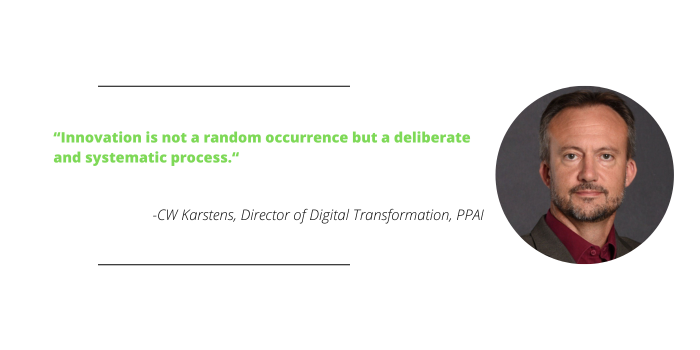A Bird's-eye View: What Innovation Can Look Like

As a recent addition to PPAI as the director of digital transformation, I am excited to be a part of innovation in the promotional products industry. Via my experiences in telecom from 2000 to 2012 with the first commercial VoIP systems and in healthcare financial technology from 2012 to 2023 with e-payments and electronic remittance advice rollouts, I have personally seen the impact that innovation can bring to an industry.
A question worth considering though is, “What is innovation?”
Innovation is a term that has become increasingly prominent in contemporary discourse. It is a concept that drives progress, fuels economic growth and reshapes the way we live and work. Is it merely the creation of new gadgets and technologies, or does it encompass a broader spectrum of human endeavors?
Innovation can be defined as the process of introducing novel ideas, methods, products or services that bring about positive change and improve the status quo. It is not limited to technological advancements – rather, it encompasses a wide range of activities across different sectors, including business, science, healthcare, education and the arts.
Forms of Innovation
Technological: This is perhaps the most widely recognized form of innovation. It involves the development of new technologies, products or processes that advance human capabilities and efficiency. Examples of technological innovation range from the invention of the wheel to the latest breakthroughs in artificial intelligence and renewable energy.
Product: Product innovation involves the creation of new or improved goods and services to meet evolving customer needs and preferences. Companies frequently invest in research and development to bring innovative products to market, enhancing their competitiveness.
Process: Process innovation focuses on improving how tasks are performed within an organization. By streamlining workflows, reducing waste and increasing efficiency, process innovation can lead to cost savings and enhanced productivity.
Business Model: This form of innovation involves rethinking the fundamental structure and strategy of a business. Companies like Airbnb and Uber revolutionized their respective industries by introducing innovative business models that connect consumers and providers in novel ways.
Social: Social innovation addresses societal challenges by proposing new solutions and approaches. It often involves collaboration between various stakeholders, including governments, nonprofits and businesses, to tackle issues such as poverty, healthcare access and environmental sustainability.
Cultural and Artistic: Innovation is not limited to the realm of science and business. In the arts and culture, innovators constantly push the boundaries of creativity, challenging traditional norms and expressing new perspectives through music, literature, visual arts and more.

The Innovation Process
Innovation is not a random occurrence but a deliberate and systematic process. It typically involves several stages:
Idea Generation: Innovation begins with the generation of creative ideas. These ideas can emerge from brainstorming sessions, research or by recognizing unmet needs in the market or society.
Research and Development: Once an idea is conceptualized, it undergoes a phase of research and development. This stage involves refining the concept, testing feasibility and developing prototypes or models.
Testing and Validation: Innovations are rigorously tested to ensure their effectiveness and viability. This stage often involves pilot projects, trials and experimentation to gather feedback and make improvements.
Implementation: Successful innovations are implemented in the real world, whether in the form of new products, services, processes or business models. This phase requires strategic planning and execution.
Scaling: To maximize the impact of an innovation, it must be scaled to reach a broader audience or market. This can involve expanding production, increasing distribution or replicating successful models in new locations.
The Impact of Innovation
Innovation is a driving force behind economic growth and success. Nations and industries that invest in research and development tend to lead in innovation, reaping the benefits of increased productivity and job creation. Innovative products and services also enhance the quality of life for individuals, providing solutions to pressing challenges and improving daily experiences.
Innovation is not confined to a single domain but rather permeates every aspect of human endeavor. It is the engine of progress, driving society forward by continuously challenging the status quo and introducing new solutions to old problems. From technological advancements to social reforms, innovation is the catalyst for positive change, shaping the future and defining the way we live, work and interact with the world.
Embracing and fostering innovation is not merely an option – it is a necessity for individuals, organizations and societies to thrive in the ever-evolving global landscape, and it is vital to the promotional products marketplace.
In future articles, I will focus on where innovative ideas come from, how to build a culture of innovation, common pitfalls, measuring success and how to apply innovation to your business.
CW Karstens is the director of digital transformation at PPAI.

